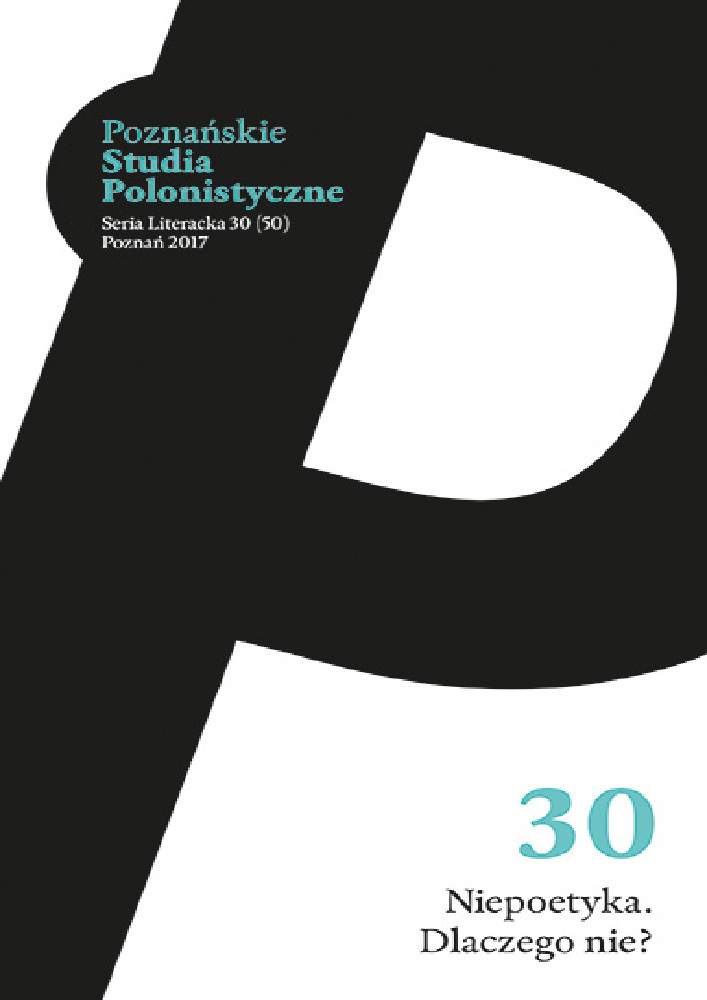Abstrakt
The article presents the new-founded relations between the genre of fairytale and its representations in video games. Following the concept of multimedia genres created by Edward Balcerzan, the article demonstrates a holistic view of the term “genre”. It combines it with the media theory by Krzysztof Kozłowski, which emphasizes social connotations of each medium and their ability to represent different genres. On the other hand, each and every genre can manifest itself through various media that enables mutual development. This theory finds its reflection in the analysis of the above-mentioned relations. The author applies the theoretical tools used for the analysis and interpretation of literary fairytales to video games based on the fairytale motifs. Two chosen examples, Trine by the Frozenbyte studio and Brothers: A Tale of Two Sons by the Starbreeze studio, represent not only a new way to fulfill the potential of the genre, but also innovative solutions in the evolution of gaming.
Bibliografia
Aarseth Espen (2006), Cybertekst. Spojrzenia na literaturę ergodyczną, [online], „Techsty”, nr 2, [dostęp: 1 lipca 2016], http://www.techsty.art.pl/magazyn2/artykuly/aarseth_cybertekst.html.
Anderson Craig, Bushman Brad (2001), Effects of violent video games on aggressive behavior, aggressive cognition, aggressive affect, physiological arousal, and prosocial behavior: A meta–analytic review of the scientific literature, „Psychological Science”, nr 12.
Balcerzan Edward (1999), W stronę genologii multimedialnej, „Teksty Drugie” z. 6, 7-24.
Barthes Roland (2000), Mitologie, przeł. Adam Dziadek, Wydawnictwo KR, Warszawa.
Balbus Stanisław (1999), Zagłada gatunków, „Teksty Drugie” nr 6, s. 25-40.
Bettelheim Bruno (2010), Cudowne i pożyteczne. O znaczeniach i wartościach baśni, przeł. Danuta Danek, Wydawnictwo WAB, Warszawa.
Czernow Anna Maria (2006), Kiedy baśniowość jest wrogiem fantasy…, w: Kulturowe konteksty baśni. t. II W poszukiwaniu straconego królestwa, red. Grzegorz Leszczyński, Centrum Sztuki Dziecka, Poznań.
Dietz Tracy (1998), An examination of violence and gender role portrayals in video games: implications for gender socialization and aggressive behavior, „Sex Roles”, nr 38, s. 425-442.
Gajda Stanisław (2008), Gatunkowe wzorce wypowiedzi, w: Polska genologia lingwistyczna, red. Danuta Ostaszewska, Romuald Cudak, Wydawnictwo Naukowe PWN, Warszawa.
Griffiths Mark (2002), The educational benefits of videogames, „Education and Health”, nr 3, s. 47-51.
Helman Alicja (2005), Baśń w świecie filmu, w: Kulturowe konteksty baśni, t. I Rozigrana córa mitu, red. Grzegorz Leszczyński, Centrum Sztuki Dziecka, Poznań.
Kochanowicz Rafał (2012), Cyfrowe antybaśnie, „Polonistyka”, nr 9, 26-30.
Kozłowski Krzysztof (2011), Co to jest medium?, „Images”, t. VIII, nr 15/16, s. 203-209.
Leszczyński Grzegorz (2005), Wstęp, w: Kulturowe konteksty baśni, t. I Rozigrana córa mitu, red. Grzegorz Leszczyński, Centrum Sztuki Dziecka, Poznań.
Łebkowska Anna (2010), Narracja, [w:] Kulturowa teoria literatury. Główne pojęcia i problemy, red. Michał Paweł Markowski, Ryszard Nycz, Universitas, Kraków.
Ługowska Jolanta (2006), Baśń jako wprowadzenie do myślenia aksjologicznego, w: Kulturowe konteksty baśni, t. II W poszukiwaniu straconego królestwa, red. Grzegorz Leszczyński, Centrum Sztuki Dziecka, Poznań.
Olszewski Paweł (2011), Polityzacja gier wideo. Ewolucja od niezobowiązującej rozrywki do zideologizowanego medium, „Homo Ludens”, nr. 1/(3), s. 167-180.
Pratchett Terry (2004), Wiedźmikołaj, przeł. Piotr Cholewa, Wydawnictwo Prószyński i S–ka, Warszawa.
Propp Wladimir (1968), Morfologia bajki, przeł. Wiesława Wojtyga-Zagórska, „Pamiętnik Literacki”, nr 59/4, 203-242.
Pullman Philip (2014), Baśnie Braci Grimm dla dorosłych i dla młodzieży. Bez cenzury, Wydawnictwo Albatros, Warszawa.
Słownik gracza, [dostęp: 15 stycznia 2017] http://www.gry-online.pl/slownik-gracza-pojecie.asp?ID=85.
Stasieńko Jan (2005), Alien vs. Predator? – gry komputerowe a badania literackie, Wydawnictwo Naukowe Dolnośląskiej Szkoły Wyższej Edukacji TWP, Wrocław.
Surdyk Augustyn (2009), Status naukowy ludologii. Przyczynek do dyskusji, „Homo Ludens”, nr 1, 223-243.
Tymińska Marta (2012), Gra jako tekst kultury – perspektywa humanistyczna, „Zeszyty Naukowe Wydziału ETI Politechniki Gdańskiej”, nr 9, s. 1-8.
Licencja
Autorzy
Autorzy tekstów przyjętych do publikacji w czasopiśmie „Poznańskie Studia Polonistyczne. Seria Literacka” są zobowiązani do wypełnienia, podpisania i odesłania na adres redakcji umowy o udzielenie nieodpłatnej licencji do utworów, z zobowiązaniem do udzielania sublicencji CC.
Zgodnie z umową, autorzy tekstów opublikowanych w czasopiśmie „Poznańskie Studia Polonistyczne. Seria Literacka” udzielają Uniwersytetowi im. Adama Mickiewicza w Poznaniu niewyłącznej i nieodpłatnej licencji oraz zezwalają na użycie sublicencji Creative Commons Attribution-NoDerivatives 4.0 International (CC BY-ND 4.0).
Autorzy zachowują prawa do dalszego, swobodnego rozporządzania utworem.
Użytkownicy
Zainteresowani użytkownicy internetu uprawnieni są do korzystania z utworów opublikowanych od 2016 roku w „Poznańskich Studiach Polonistycznych. Serii Literackiej” pod następującymi warunkami:
- uznanie autorstwa – obowiązek podania wraz z rozpowszechnionym utworem, informacji, o autorstwie, tytule, źródle (odnośniki do oryginalnego utworu, DOI) oraz samej licencji;
- bez tworzenia utworów zależnych – utwór musi być zachowany w oryginalnej postaci, nie można bez zgody twórcy rozpowszechniać np. tłumaczeń, opracowań.
Do wszystkich tekstów opublikowanych przed 2016 r. prawa autorskie są zastrzeżone.
Inne
Uniwersytet im. Adama Mickiewicza w Poznaniu zachowuje prawo do czasopisma jako całości (układ, forma graficzna, tytuł, projekt okładki, logo itp.).
